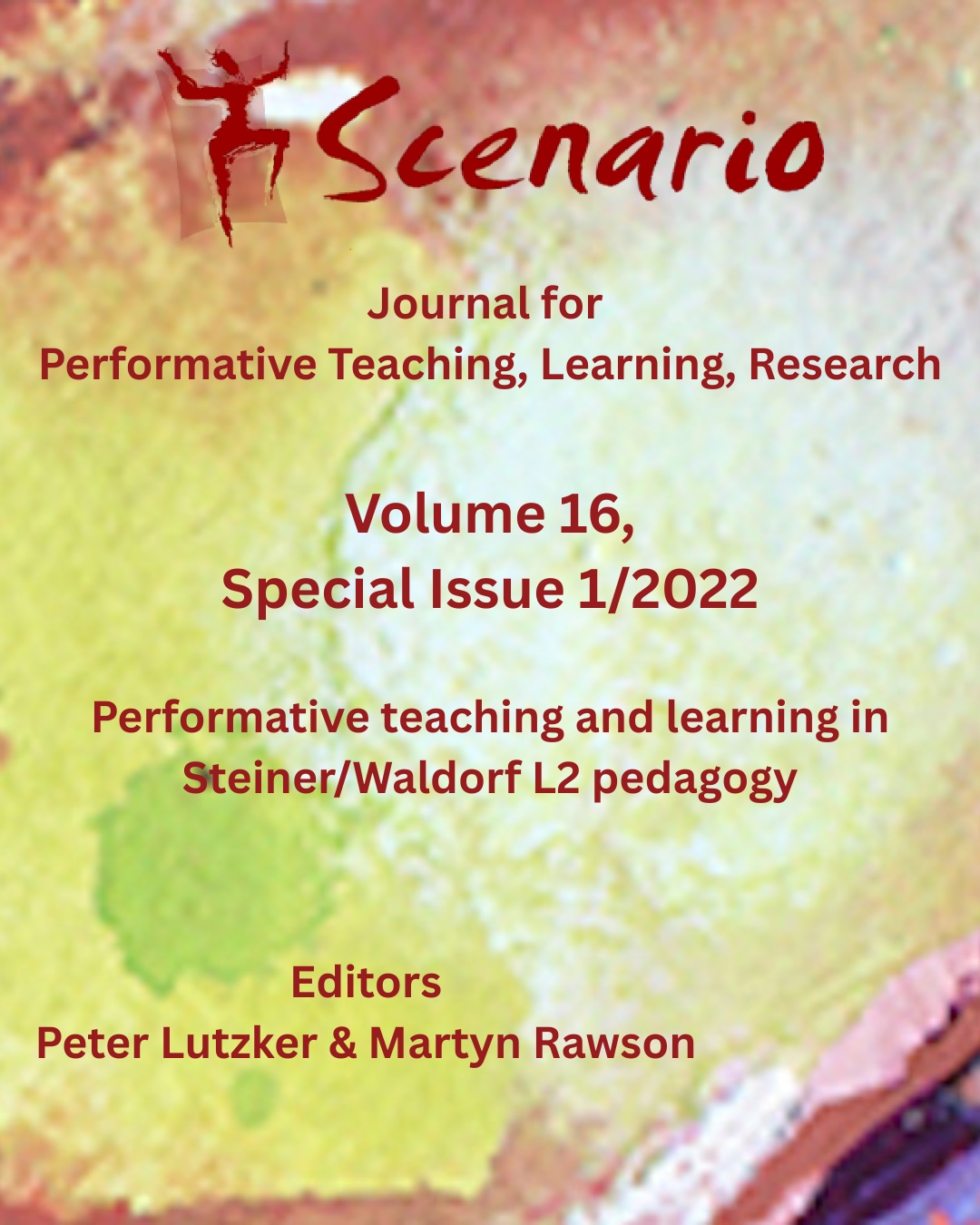Developing the artistry of the teacher in Steiner/Waldorf Education (Part I)
DOI:
https://doi.org/10.33178/scenario.16.1.4Keywords:
Steiner/Waldorf teacher education, Teaching as an art, Arts in teacher education, pedagogical anthropology, Anthroposophy, holistic child development, Waldorf pedagogy, Pedagogical intuitionAbstract
This article examines different concepts underlying Steiner/Waldorf teacher education and how they are put into practice. It explains how teaching understood as an art can be seen as a leitmotif going through an entire course of studies. It elucidates the central role which pedagogical anthropology plays in Steiner/Waldorf teacher education and the specific contribution of Rudolf Steiner’s understanding of Anthroposophy in this context. The prominent role which the study and practice of different arts plays in Steiner/Waldorf teacher education programs is explained and the reasons for the inclusion of artistic practice in teacher education are discussed. The understanding in Steiner/Waldorf teacher education programs of how teacher education is then transformed into a teacher’s classroom practice is examined including its role in providing a basis for a teacher’s pedagogical intuitions.
References
Bollnow, O. F. (1982). Vom Geist des Übens. Herder.
Dewey, J. (1948). Foreword to Henry Schaefer-Simmern, The unfolding of artistic activity: Its basis, processes and implications. University of California Press. https://doi.org/10.1525/9780520321465
Dewey, J. (1980). Art as experience. G.P. Putnam’s Sons.
Eisner, E. (1985). The educational imagination: On the design and evaluation of school programs. Macmillan.
Eisner, E. (2002). Arts and the creation of the mind. Yale University Press.
Goethe, J. W. (1988). Werke: Zur Naturwissenschaft im Allgemeinen, Studie nach Spinoza (Vol. 13). Hanser.
Gögelein, C. (1994). Was sind bestimmende Grundlagen der Waldorfpädagogik und aus welchen Quellen schöpft sie? In S. Leber (Ed.), Waldorfschule Heute: Einführung in die Lebensformen einer Pädagogik (pp. 300-328). Verlag Freies Geistesleben.
Greene, M. (1995). Releasing the imagination: Essays on education, the arts, and social change. Jossey-Bass.
Greene, M. (2001). Variations on a blue guitar: The Lincoln Center Institute lectures on aesthetic education. Teachers College Press.
INASTE (2021). Retrieved from https://www.inaste-network.com/
Jeuken, M., & Lutzker, P. (2019). Lehrerbildung für Waldorfschulen: Das waldorfpädagogische Studium. In A. Wiehl (Ed.), Studienbuch Waldorfpädagogik (pp. 291-306). Klinkhardt.
Kaplan, Allan (2002). Development practitioners and social process: Artists of the invisible. Pluto Press.
Kiersch, J. (2008). Vom Land aufs Meer. Steiners Esoterik in verändertem Umfeld. Verlag Freies Geistesleben.
Kranich, E. M. (2000). Zu einem neuen Bild von Unterricht. In H. Rumpf & E. M. Kranich (Eds.), Welche Art von Wissen braucht der Lehrer? (pp. 131-134). Klett-Cotta.
Kullak-Ublick, H., & Zdražil, T. (Eds.). (2019). Die Menschenkunde der Waldorfpädagogik in der Vielfalt der Kulturen der Welt. Edition Waldorf.
Lindenberg C. (1985). Die Lebensbedingungen des Erziehens: Von Waldorfschulen Lernen. Rowohlt.
Loebell, P. (2013). Zur wissenschaftlichen Ausbildung von Waldorflehrern. In H. Barz (Ed.), Unterrichten an Waldorfschulen (pp. 211-230). VS Verlag. https://doi.org/10.1007/978-3-658-00551-1_12
Lutzker, P. (2021). Teaching as an Art in an Age of Science and Technology. In Tsing Hua Journal of Education Research, 37 (2), 1-64. https://edujou.site.nthu.edu.tw/var/file/128/1128/img/1172/37-2-1.pdf
Lutzker, P., & Zdražil, T. (Eds.). (2019). Zugänge zur Allgemeinen Menschenkunde Rudolf Steiners: Wissenschaftliche, ku?nstlerische und schulpraktische Perspektiven. Edition Waldorf.
Martzog, P., Kuttner, S., & Pollak, G. (2016). A comparison of Waldorf and non-Waldorf student-teachers’ social-emotional competencies: Can arts engagement explain differences? In Journal of Education for Teaching: International Research and Pedagogy, 42(1), 1-14. https://doi.org/10.1080/02607476.2015.1131365
Martzog, P., Nieke, W., & Hoyer, S., (2018). Studien zu Wirkungen der Waldorflehrerbildung: Empirische Forschung – der andere Blick. In H. Kern, T. Zdrazil & W.M. Götte (Eds.), Lehrerbildung für Waldorfschulen: Erziehungskünstler werden. Beltz Juventa.
Rawson, M. (2021). Steiner Waldorf pedagogy in schools: A critical introduction. Routledge.
Rittelmeyer, C. (2017). Anthropologische Grundlagen der Lehrerbildung. In P. Loebell & P. Martzog (Eds.), Wege zur Lehrerpersönlichkeit (pp. 39-58). Budrich. https://doi.org/10.2307/j.ctvddztqd.6
Rumpf, H., & Kranich, E. M. (2000). Welche Art von Wissen braucht der Lehrer? Klett-Cotta.
Sarason, S. B. (1999). Teaching as a performing art. Teachers College Press.
Schewe, M., & Even, S. (Eds.). (2016). Performatives Lehren Lernen Forschen – Performative teaching learning research. Schibri Verlag.
Schieren, J. (2010). Die Veranlagung von intuitiven Fähigkeiten in der Pädagogik. In Research on Steiner Education, (1), 7-18. https://www.rosejourn.com/index.php/rose/article/view/3
Schwebsch, E. (1932). Rezension zu Rudolf Steiners Allgemeine Menschenkunde als Grundlage der Pädagogik. Die Drei, (1), pp. 77-78. https://diedrei.org/ausgabe/heft-1-1932
Sennet, R. (2008). The craftsman. Yale University Press.
Steiner, R. (1975). Awakening to community. (GA 257). Anthroposophic Press. https://doi.org/10.1002/cc.36819751109
Steiner, R. (1996). The foundations of human experience. (GA 293). Anthroposophic Press.
Steiner, R. (2004). Pädagogik und Kunst. (GA 304a). In J. Kiersch (Ed.), Texte zur Pädagogik aus dem Werk von Rudolf Steiner: Anthroposophie und Erziehungswissenschaft. (pp. 605-608). Rudolf Steiner Verlag.
Steiner, R. (2007) Anthroposophical leading thoughts. (GA 26). Rudolf Steiner Press.
Van Manen, M. (1995). On the epistemology of reflective practice. Teachers and Teaching Theory and Practice. 1(1), 33-50. https://doi.org/10.1080/1354060950010104
Van Manen, M. (2015). Pedagogical tact: Knowing what to do when you don’t know what to do. Left Coast Press. https://doi.org/10.4324/9781315422855
Zdražil, T. (2019). Freie Waldorfschule in Stuttgart 1919 – 1925. Edition Waldorf.
Zdražil, T. (Ed.). (2016). Anthroposophie und Pädagogik: Beiträge zur Allgemeinen Menschenkunde Rudolf Steiners. Edition Waldorf.
Downloads
Published
Issue
Section
License
Copyright (c) 2022 Peter Lutzker

This work is licensed under a Creative Commons Attribution-NonCommercial 4.0 International License.







